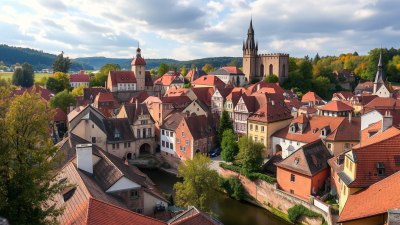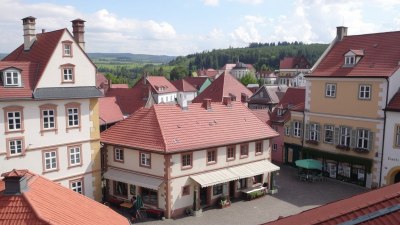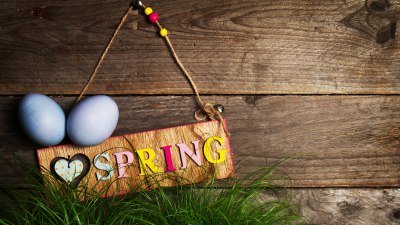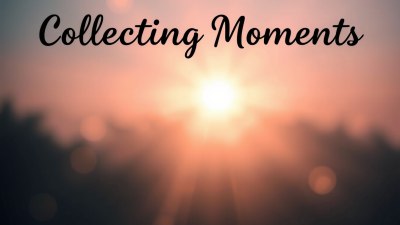Exploring Local Fairy Tales Through Storytelling Walks in Forests
Discover the magic of local fairy tales on storytelling walks through enchanting forests. Immerse yourself in nature and folklore.

Image created with Flux Schnell
Fairy tales have captivated audiences for centuries, serving as a bridge between generations and cultures. These stories, often infused with moral lessons, mythical creatures, and enchanting settings, can be a magical way to connect with nature. Storytelling walks in forests not only help to enrich our understanding of these tales but also create a unique experience that engages multiple senses.
This article will explore the significance of local fairy tales, the benefits of storytelling walks in natural settings, and provide tips on how to effectively organize such an adventure. By rekindling the love for folklore through immersive experiences, participants can foster a deeper appreciation of their natural surroundings and the stories that have shaped them.
The Enchantment of Local Fairy Tales
Local fairy tales serve as a timeless medium through which cultural values and wisdom are expressed. Originating from oral traditions, these narratives have been passed down through generations, each storyteller adding their personal flair to the tale. Fairy tales feature common elements such as magical beings, heroic quests, and fantastic realms, often reflecting the social and moral values of the community.
Many cultures have their own unique set of fairy tales that celebrate local flora and fauna, mystical creatures, and human experiences. Embracing these stories allows us to honor the past while engaging with our environment. By weaving local folklore into storytelling walks, participants gain a sense of connection not just with nature but also with their cultural heritage.
The Benefits of Storytelling Walks
Storytelling walks offer numerous benefits for participants of all ages. Firstly, they provide a blended experience of physical activity and emotional engagement. Walking in natural settings enhances mental well-being, as studies show that exposure to nature can reduce stress levels and promote relaxation.
Moreover, storytelling stimulates our imagination, encourages creativity, and can strengthen social bonds among participants. Sharing stories fosters a sense of belonging, feeds curiosity, and helps develop listening skills. As walkers immerse themselves in local fairy tales, they can envision the characters and settings, transforming an ordinary hike into a fantastical journey.
How to Organize a Storytelling Walk
Organizing a storytelling walk involves thoughtful planning to create an engaging experience. Here are steps to consider when creating your own storytelling adventure:
- Select a Location: Choose a forest or trail that complements the local fairy tales you wish to share. Look for areas with diverse scenery, such as streams, hills, or unique flora.
- Choose Tales Wisely: Research and select fairy tales that resonate with the chosen location. For example, if the area is known for its majestic oak trees, consider stories featuring tree spirits or wise animals.
- Plan the Route: Map out a route that includes stops for storytelling. Ensure that the distance is manageable for all participants, especially if children are involved.
- Engage Local Artists: Consider inviting local storytellers or musicians to enhance the experience. Their voices can breathe life into the tales, making them more accessible and engaging.
- Prepare Visual Aids: Use props, illustrations, or local flora to enhance storytelling. Visual aids help create a more immersive experience and captivate participants’ attention.
- Promote Interaction: Encourage participants to share their thoughts and interpretations of the stories. Facilitate discussions about the cultural significance and moral lessons embedded in the fairy tales.
Sample Local Fairy Tales
Every region boasts unique fairy tales that capture the essence of its culture. Here are a few examples of local stories that can be woven into a storytelling walk:
- “The Tale of the Whispering Pines”: This story follows a young girl who discovers the wisdom of the ancient pine trees and learns the importance of listening to nature.
- “The Lake of Lost Dreams”: A tale about enchanted waters that reflect the dreams of those who gaze upon them, reminding participants of the power of hope and resilience.
- “The Fox and the Differences”: A fable illustrating the importance of embracing our unique traits and finding friendship despite differences, portrayed through the adventures of a clever fox.
- “The Starlit Journey”: This tale celebrates the beauty of the night sky and the stories written in the stars, encouraging participants to look beyond and find their paths.
Making it Inclusive
To ensure that the storytelling walk is accessible to everyone, consider including elements that address diverse audiences. This can involve offering stories in different languages, utilizing various forms of storytelling such as puppetry or music, and adapting the physical route to accommodate individuals of all abilities.
Additionally, providing resources for participants such as printed copies of the stories, illustrations, or even digital aids can greatly enhance engagement, allowing for a deeper exploration of the lore being shared.
Bringing People Together
Storytelling walks have the power to create a sense of community. By participating in a shared experience, individuals can foster relationships and develop a greater sense of belonging. As the stories unfold, laughter and discussion can emerge, encouraging connections that may not be established in more conventional settings.
Encouraging families and friends to attend together not only strengthens those bonds but also provides opportunities for intergenerational sharing of stories, allowing elders to pass down wisdom to younger generations. The collective nature of storytelling creates a space where participants can come together to celebrate culture, creativity, and the environment.
Environmental Awareness Through Fairy Tales
Integrating fairy tales with nature walks offers a perfect opportunity to educate participants about environmental stewardship. Many local tales are centered around nature and its preservation, showcasing the bond between humanity and the earth.
As participants hear tales of mythical creatures protecting their habitats or of heroes rescuing endangered plants and animals, they may feel a sense of responsibility to conserve the environment themselves. Encouraging discussions about sustainability, biodiversity, and conservation can elevate the experience further, creating informed individuals who value and protect their natural surroundings.
Technology and Storytelling
In our digital age, technology can enhance storytelling walks. Creating an app or using social media platforms can help promote the event and engage a larger audience. Provide features such as audio narrations, interactive maps, or augmented reality experiences tied to the local fairy tales to engage younger audiences.
The use of technology isn’t just for promoting the walk but can also enrich the storytelling experience. For example, utilizing QR codes placed along the trail can enable participants to hear audio recordings of stories or access additional information about the fairy tales being shared. Integrating tech in this way allows for a blend of traditional storytelling with modern conveniences.
Exploring local fairy tales through storytelling walks in forests offers an engaging way to connect with culture, nature, and community. By celebrating folklore within the context of the natural world, participants can rediscover a sense of wonder and enchantment that is often lost in our modern-day lives.
The impact of such experiences promotes environmental awareness, strengthens community ties, and fosters a love for storytelling that can transcend generations. Whether you are a seasoned storyteller or a curious nature lover, embarking on a storytelling walk can unveil the hidden magic of local tales while simultaneously enriching your understanding of the world around you.











